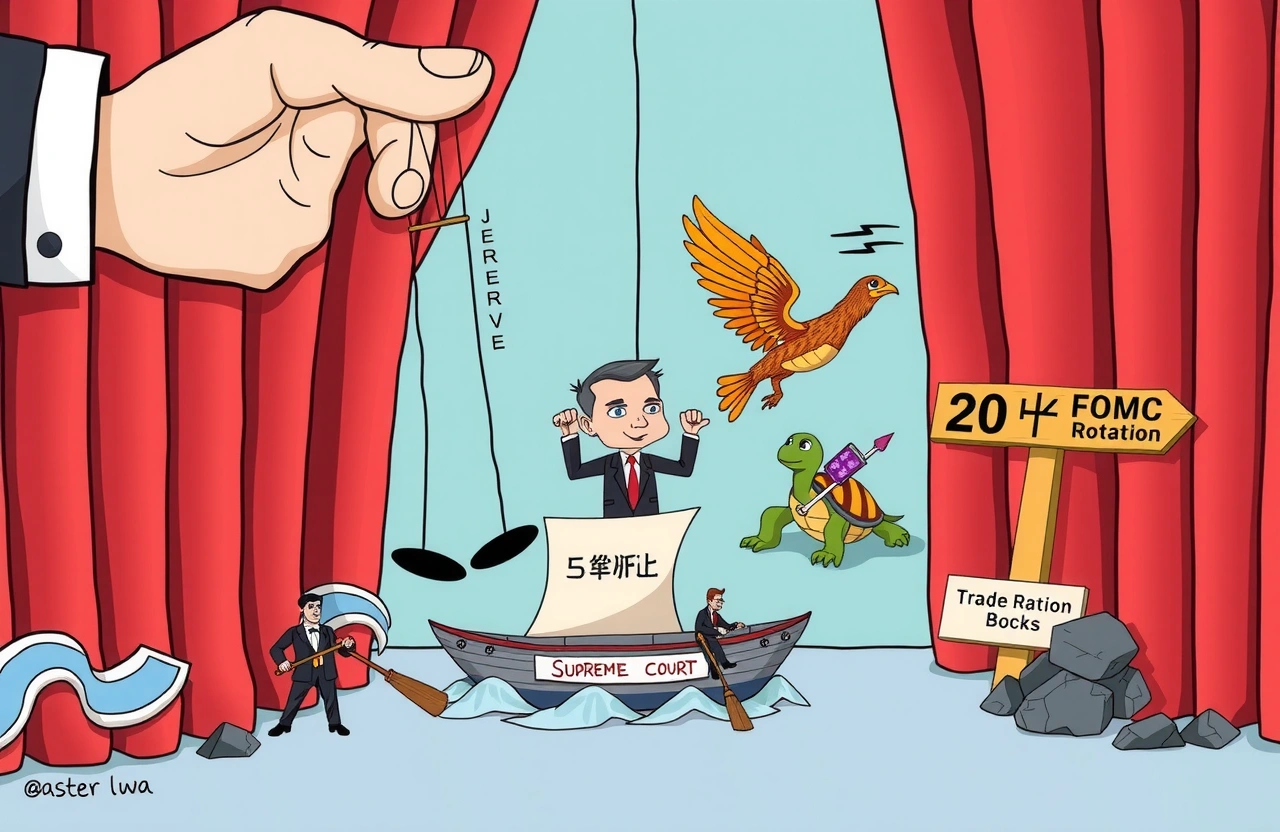– JPMorgan dismisses Fed independence as mythical despite Trump’s pressure on Powell
– Fed chairs historically faced political interference dating back to Johnson administration
– Market will soon price in next Fed chair’s policies as Powell’s term nears end
– Legal battle would erupt over Powell’s removal requiring Supreme Court intervention
– Investors told: Stay long S&P 500 with volatility hedges as rate cut bets grow
The Theater of Central Banking
President Trump’s public threats against Federal Reserve Chair Jerome Powell (鲍威尔) triggered momentary market panic before denial stabilized stocks—yet this political theater exposes a deeper truth. According to JPMorgan researchers, market participants worrying about Federal Reserve independence misunderstand decades of reality. The Federal Reserve has always operated under political duress despite institutional mythology portraying insulated technocrats objectively calibrating monetary policy.
Central bank governors quietly navigated Oval Office pressures since Lyndon Johnson summoned Fed Chair William McChesney Martin (马龙) to his Texas ranch in 1965 to rage against rate hikes. Today, Powell contends with unprecedented public demands from Trump, who openly entertained dismissal discussions citing Section 10 of the Federal Reserve Act’s “for cause” removal clause. While Powell likely retains his position until term expiration, investors should recognize that the Fed independence myth obscures inevitable policy shifts favoring equities as dovish factions consolidate control ahead of potential 2025 leadership transition.
The Deep Roots of Political Interference
Historical Precedents Ignored
JPMorgan derivatives strategist Ilan Benhamou observes the current political pressure spectacle replicates decades of hidden negotiations: “The situation unfolding today happened behind closed doors for generations.” Johnson’s confrontation with Martin established blueprint for executive coercion despite Martin’s resistance. Presidents Reagan and Clinton maintained decorum through Treasury intermediaries while exerting influence during elections and crises.
Wall Street’s Contradictory Defense
While CEOs like JPMorgan’s Jamie Dimon (戴蒙) publicly champion Fed autonomy, banking institutions simultaneously lobby aggressively on regulations and liquidity provisions. This institutional hypocrisy reinforces Benhamou’s conclusion: “Fed independence is foundational mythology, not operational reality.” Congress mandates the Fed’s dual goals while presidents appoint governors—structural vulnerabilities ensuring responsiveness to political currents.
The Irrelevance of Powell’s Tenure
Market Forward-Pricing Mechanisms
Benhamou notes Powell’s potential removal “doesn’t materially matter” because markets will imminently discount successor policies. Powell’s term expires May 2026, though presidential transition could accelerate leadership change given Trump’s public antagonism. Futures traders already position for deeper 2025 rate cuts than FOMC projections suggest amid currency war risks and tariff-driven inflation uncertainty.
Growing Dovish Consensus
Potential successors including Christopher Waller and Kevin Warsh would inherit a FOMC increasingly supporting accommodation despite internal divisions. Benhamou predicts intensifying “dovish competition” as trade conflicts escalate alongside moderating inflation prints. Voting rotation bringing historically moderate 2024 regional bank presidents guarantees policy fluidity regardless of Powell’s position.
Removal Mechanics and Legal Chaos
Unprecedented Fed chair dismissal would ignite constitutional firestorms despite Trump allies alleging grounds through Fed budget discrepancies. Immediate reinstatement lawsuits would see Powell petition federal courts citing statutory protections. Vice Chair Philip Jefferson (杰斐逊) would temporarily assume leadership pending Supreme Court resolution—where Trump-appointed justices dominate.
Recent rulings suggest favorable Trump adjudication: 2023’s expanded presidential immunity precedents signal judicial tolerance for executive discretion. Past decisions show minimal protection for independent agencies—2020’s Seila Law LLC v. CFPB affirmed presidential removal powers over agencies despite structural independence claims.
Investment Strategy Amid Political Uncertainty
Despite volatility risks, JPMorgan maintains constructive equity outlook:
– Maintain S&P 500 exposure through dips
– Hedge volatility with strategic VIX allocations
– Target AI-enabler stocks (semiconductors, cloud infrastructure)
– Position in rate-sensitive tech/growth stocks
– Monitor cryptocurrencies for trade-warning significance
The Myth’s Practical Implications
Acknowledging Fed independence myth encourages clearer investing frameworks: political pressure historically weakened policy resolve during late-cycle economies. Trump-era tariff threats combined with Powell nearing term-end create unusually strong alignment between executive jawboning and monetary incentives. Markets correctly ignore hollow independence rhetoric while pricing pragmatic accommodation paths.
Navigating the Policy Void
Traders should recalibrate frameworks: central banking exists within politics rather than above it. Dismissing mythical independence enables clearer predictions of accommodation expansion during election windows regardless of inflation data. JPMorgan urges investors to maintain risk exposure while deploying volatility hedges recognizing treasury markets already price accelerating rate cuts ahead of FOMC acknowledgment.
The Fed’s ongoing legitimacy depends partially on preserving theater differing from reality—but successful investors distinguish performance from fundamentals. Position portfolios for dovish policy certainty despite institutional theatrics by increasing exposure to momentum-sensitive assets through 2025.



